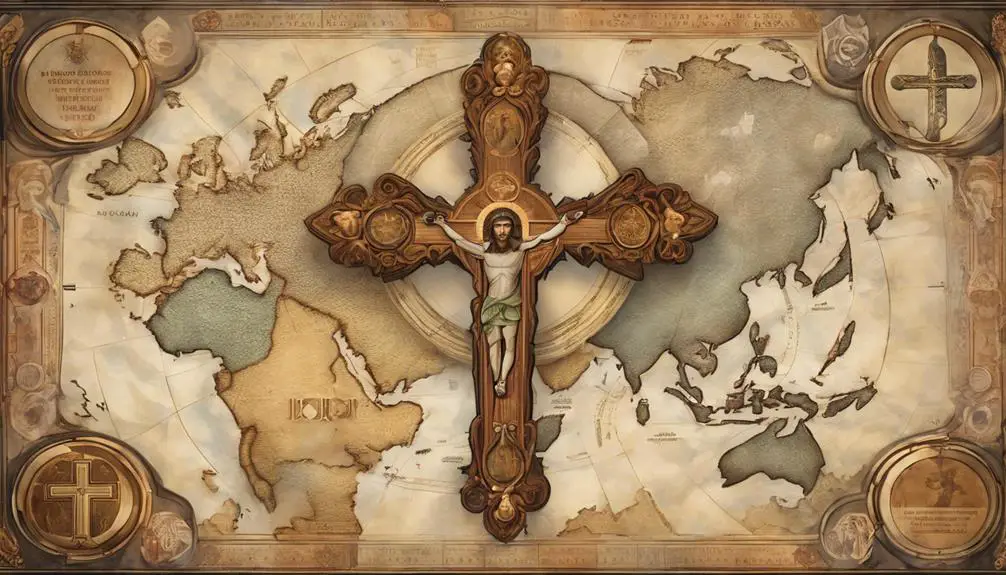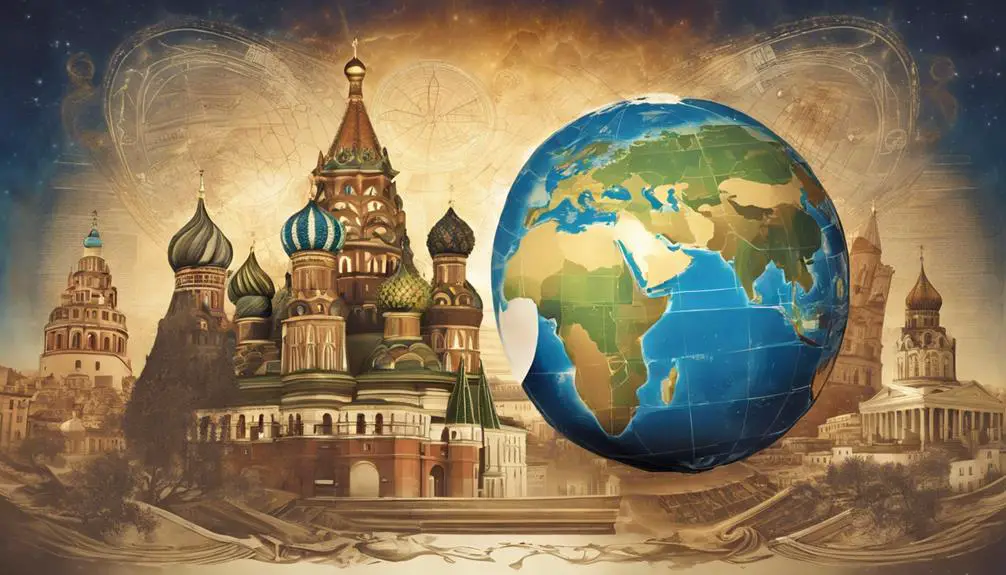A journey into deciphering if ancient prophecies in the Bible hint at Russia's role in modern geopolitics, sparking curiosity and debate.

Is Russia in the Bible
Imagine standing at the crossroads of history and prophecy, where ancient texts whisper secrets about modern giants. You might wonder if Russia, a nation of vast landscapes and deep cultural roots, finds its echo within the Bible's pages.
Scholars pore over passages and prophecies, debating whether names like Magog, Rosh, and Gog from Ezekiel's visions could be veiled references to this contemporary power. This discussion opens a door to a realm where historical context, biblical passages, and interpretations of prophecy converge, inviting you to explore how ancient words might reflect on today's geopolitical chessboard.
The insights you uncover could reshape your understanding of prophecy and its relevance in our modern world.
Key Takeaways
- Biblical interpretations often symbolize Russia in end-times scenarios through references to "Gog" and "Magog."
- Scholarly perspectives caution against directly equating modern nations with ancient texts due to linguistic and historical complexities.
- Interpretations of Russia in biblical prophecy significantly impact its contemporary geopolitical narratives and alliances.
- The challenge in interpreting apocalyptic literature emphasizes the symbolic and allegorical nature of prophecies concerning modern nations like Russia.
Historical Context

To understand references to Russia in the Bible, it's crucial to delve into the historical context, tracing back the roots and interpretations of ancient texts. You'll find that the geopolitical shifts and cultural influence of various empires have profoundly shaped the way these references are interpreted. Historically, the lands now known as Russia were inhabited by diverse tribes and peoples, far removed from the biblical epicenters of the Middle East. Yet, as empires expanded and cultures intermingled, the relevance and understanding of biblical prophecies and references evolved.
The ancient world was a tapestry of shifting borders and alliances, with empires rising and falling, influencing and being influenced by the cultural and spiritual practices of their neighbors. In this complex geopolitical landscape, identifying direct references to modern nations in ancient texts requires a nuanced approach. You must consider how translations, interpretations, and the understanding of geography have changed over millennia. The cultural influence of the Judeo-Christian tradition spread far and wide, intersecting with the histories of peoples across Eurasia, including those in the vast territories of what's now Russia. This intersection of cultures and beliefs, shaped by and shaping geopolitical realities, is key to understanding any potential references to Russia in biblical texts.
Key Biblical Passages
Building on this understanding of historical context, let's examine specific biblical passages that scholars have linked to modern-day Russia, exploring the interpretations and debates surrounding these references. Central to this discussion is the Gog identity and the Magog debate, often found in the prophetic books of Ezekiel and Revelation.
Ezekiel chapters 38 and 39 describe Gog, of the land of Magog, as the leader of a coalition of nations that will attack Israel in the end times. Scholars debate whether 'Magog' refers to a specific geographical location or symbolizes a coalition of nations against God's people. The identity of Gog is similarly contentious, with some suggesting it could symbolize an evil force from the north, potentially linking it to modern Russia due to geographical and symbolic interpretations.
The Magog debate extends into the Book of Revelation, where Gog and Magog are mentioned again in the context of a final battle. The ambiguity of these texts has led to various interpretations, with some seeing them as allegorical, while others search for historical and geopolitical correlations, including the potential link to Russia.
This analysis reveals the complexity of correlating ancient biblical prophecies with contemporary nations, demonstrating the challenges inherent in biblical interpretation related to geographical identities.
Interpretations of Prophecy

Delving into the interpretations of prophecy, it's crucial to understand how diverse perspectives shape our analysis of ancient texts and their implications for the modern world. As you explore these interpretations, you'll find that symbolic meanings play a significant role, especially within the realm of apocalyptic literature. This genre often employs vivid imagery and symbols to convey messages about the end times, judgment, and salvation.
The following table provides a visual representation of ideas related to the interpretations of prophecy:
Perspective |
Symbolic Meanings |
Apocalyptic Literature |
|---|---|---|
Historical |
Events as allegories for past happenings |
Records of divine intervention |
Futuristic |
Predictions of future events |
Forewarnings and divine promises |
Symbolic/Spiritual |
Metaphors for spiritual truths and moral lessons |
Visions meant to inspire and instruct |
These perspectives showcase how interpretations can vary widely. Some view prophecies as concrete predictions of future events, while others see them as allegorical, packed with symbolic meanings meant to convey spiritual truths rather than literal foretellings. This complexity underscores the challenge of interpreting apocalyptic literature, where the line between past, present, and future often blurs, inviting readers into a deep, reflective engagement with the text.
Scholarly Opinions
Scholars' opinions vary widely on the presence and significance of Russia in biblical prophecies, reflecting diverse interpretative frameworks rooted in historical, symbolic, and futuristic perspectives. The academic debate centers around key methodological approaches including linguistic analysis and geographical accuracy, which shape scholars' conclusions.
- Linguistic Analysis: You'll find that some scholars emphasize the importance of understanding ancient languages and cultural contexts. They argue that without precise linguistic analysis, identifying modern nations in ancient texts becomes speculative at best.
- Geographical Accuracy: Others focus on the geographical descriptions provided in the scriptures, comparing them with contemporary maps to locate prophesied events. This approach often leads to debates about the accuracy and relevance of specific prophecies to modern Russia.
- Historical Context: The historical approach considers the circumstances and knowledge of the time when the biblical texts were written. Scholars using this lens often caution against anachronistic readings that apply modern geopolitical realities retroactively.
- Symbolic Interpretation: A significant number of experts view biblical prophecies through a symbolic lens, suggesting that attempts to link these prophecies with specific modern nations overlook the broader, timeless messages intended by the texts.
These diverse scholarly opinions highlight the complexity of interpreting ancient prophecies in a modern context, underscoring the challenges of drawing direct correlations between biblical texts and contemporary geopolitical entities.
Modern Implications

Given the range of scholarly opinions on the presence of Russia in biblical prophecies, it's crucial to explore how these interpretations influence contemporary geopolitical narratives and perceptions. These perspectives shape not only the academic discourse but also public understanding and policy formulations, making it imperative to delve into the complexities of such claims.
The assertion that Russia plays a pivotal role in end-times scenarios, as interpreted by some scholars, significantly impacts geopolitical alliances. This view can foster a preconceived notion of inevitability in international relations, potentially guiding the formation of strategic partnerships and rivalries. You'll notice that nations might align their policies and diplomatic efforts based on these prophetic interpretations, affecting global power dynamics.
Furthermore, the cultural influence of such beliefs can't be understated. They permeate societal values and norms, shaping the collective psyche towards Russia and its global positioning. This cultural undertow influences public opinion, potentially swaying political stances and affecting bilateral relations.
Frequently Asked Questions
How Do Contemporary Russian Religious Leaders Interpret Their Country's Role in Biblical Prophecy?
You're exploring how contemporary Russian religious leaders perceive their nation's role in biblical prophecy. They often reference Ezekiel's Gog to support their views, seeing Russia as pivotal in apocalyptic interpretations.
This analysis reveals a blend of national identity with spiritual destiny, where leaders interpret ancient texts to reflect modern geopolitical scenarios. Their interpretations aren't only religious but deeply entwined with a sense of historical and cultural significance, shaping how followers perceive global events.
Are There Any Significant Archaeological Findings in Russia That Support or Contradict Its Mention or Role in the Bible?
You're exploring significant archaeological findings in Russia, curious if they support or contradict its mention or role in the Bible.
Delving into Kremlin excavations and Siberian manuscripts, you analyze these discoveries for potential biblical connections.
While the Kremlin excavation offers insight into Russia's historical layers, Siberian manuscripts could hold ancient narratives.
However, directly linking these findings to biblical prophecy requires careful interpretation, as the evidence remains largely circumstantial and open to scholarly debate.
How Do Different Christian Denominations Within Russia View the Idea of Their Country Being Mentioned in Biblical Prophecies?
You're diving into how Christian denominations in Russia perceive their nation's role in biblical prophecies. This exploration requires understanding cultural perspectives and historical context.
Various groups view the idea differently, reflecting their doctrines and interpretations of scripture. Some see Russia's mention as symbolic, others literal, influenced by theological traditions and cultural identities.
This analysis isn't just about religious beliefs; it's about how these beliefs intersect with national identity and history.
Has the Concept of Russia in the Bible Influenced Russian National Identity or Political Ideology in Any Significant Way?
You've likely seen how cultural symbolism and geopolitical interpretations shape national identities.
In Russia, the notion that it's referenced in biblical prophecies significantly influences both its national identity and political ideology.
This interweaving of religious narratives with state narratives fosters a unique blend of pride and destiny among citizens, driving political strategies and public sentiment.
This phenomenon underscores the power of religious texts in shaping geopolitical landscapes and collective self-perception.
What Role Do Linguistic Analyses Play in Understanding References That Could Be Tied to Russia in Ancient Biblical Texts?
Ironically, you're diving deep without a map, trying to pinpoint modern nations in ancient scripts. Linguistic analyses are your torch in this dark cave. They unravel translation challenges, shining light on words that have journeyed through centuries.
Understanding references tied to specific locations demands a grasp of historical context—how meanings shift over time. This analytical approach isn't just about decoding texts; it's about peeling back layers to reveal how ancient narratives intersect with today's world.
Conclusion
In the tapestry of biblical narrative, Russia's threads aren't explicitly woven. Yet, through the lens of prophecy and interpretation, scholars have sought to find its silhouette in ancient texts.
Like finding shapes in clouds, interpretations vary widely, reflecting more about the observer than the observed. Academically, the consensus remains elusive, a mirage on the horizon of biblical scholarship.
The modern implications of such identifications are a kaleidoscope, constantly shifting with the light of contemporary events and scholarly debates.



Sign up